Hey guys!
Glad you all like the look of the peanut noodles. This week’s Question of the Week comes from reader Callie, who asks,
Hello Gena,
I have a quick question for you. I am a young dietitian and I am very curious about exploring all different eating styles and patterns and raw food is very interesting to me. I am currently doing some “summer research” on omega three fatty acids and I was just wondering what your take on the subject is. I know you can get all your essential fatty acids from plant sources of omega-3’s but I was wondering about EPA and DHA (found in fatty fish) specifically. I am currently reading a book called the Ultimate Omega 3 diet. The book and much research I have read states that although our bodies can convert ALA to EPA and DHA, it is a very slow conversion . . . I was wondering what research you know of that supports or does not support the need for supplement and if you do not mind disclosing whether you take a supplement . . . Not sure if you eat seafood and you may get all the EPA/DHA you need, but just wondering for those that do not eat seafood.
Thanks so much, Callie
This is a great question, and I’m grateful to Callie for asking.
Omega-3 fatty acids are indeed an important part of the human diet; there’s good research to show that they play a role in combating conditions from allergies and arthritis to diabetes, eczema, stroke, and weight gain. It’s also true that while most Americans get a good number of Omega-6 fatty acids in their diets, most of us don’t get enough Omega-3s; an ideal dietary ratio of Omega-3 to Omega-6s would be 1:4. It’s not uncommon, though, for Americans to have a ratio of 1:20 instead.
The most commonly known plant-based Omega-3 is alpha-linolenic acid (or ALA). When it’s broken down in the human body (with the aid of certain vitamins), ALA can be converted into two other acids: EPA (eicosapentanoic acid) and DHA (docosahexanoic acid). Callie’s concern – and that of others who are considering veganism – is that it isn’t always easy for the body to convert ALA to EPA and DHA. To get DHA directly—without the body’s conversion—one would have to rely on a fish source (salmon oil and other fish oils are most common) or an algae source, usually found in supplemental form. All the more reason why it was smart of you, Callie, to ask!
I don’t take a supplement on a daily basis, but I would if I were pregnant (DHAs are important for fetal brain development) or if I had signs that I needed more than I get. I do occasionally have algaes in my smoothies and (more significantly) enjoy a number of oil blends that are EFA and DHA rich.
Lately, I’ve been enjoying the Vega EFA oil blend, with I asked to sample a few weeks ago (and the kind folks at Vega obliged). It’s delicious: like all hemp and flax oil blends, it has rich, nutty undertones. It works beautifully on massaged kale salad or drizzled into blended soups.
For DHA needs, Udo’s Oils makes a DHA oil blend that is also very high quality.
Have a great night, all!
xo
This post may contain affiliate links. If you use these links to buy something I may earn a commission. Visit my privacy policy to learn more.


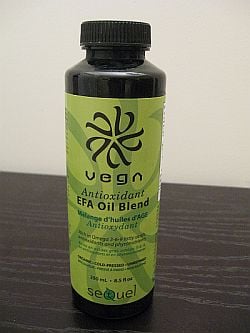
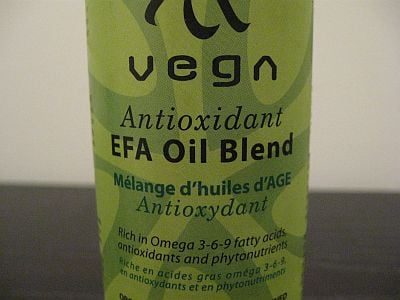
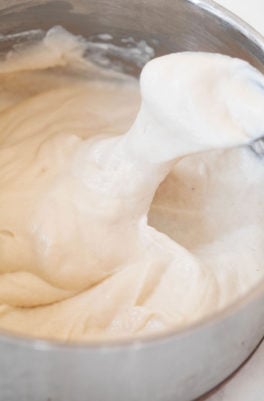
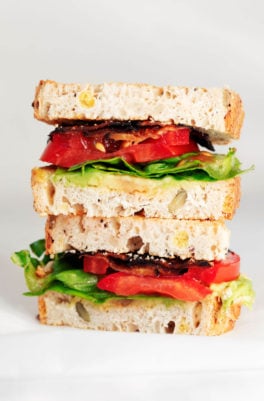

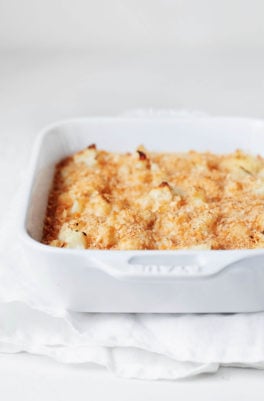
Leave a Comment
Thank you for re-linking back to this post. I JUST read a pamphlet on the importance of fish oils at my work today, and was wondering how vegans met their needs. I remember you wrote this post some time back but couldn’t figure out how to get back to it! Timely, as always, Gena Hamshaw… 🙂
Kate, you say plant sources are not a reliable source of omega 3? The fact is that fish get their omega 3 (dha) from a plant, they do not manufacture it. Fish oil also contains the mercury. So, it is actually best to get your omega 3 (DHA) from sea vegetables.
As for B12, I used to take a supplement, but stopped. I get my levels checked often and they are always good. A varied vegan diet supplies everything the body needs.
Hi Gena,
Very informative post, once again!
I would be very interested in reading your take on vitamin B12 as well. I am not very interested in taking supplement but I keep on hearing that it is impossible to get vitamin B12 in a vegan diet.
I really don’t understand what this is all about…
Thanks,
Alex
how did you get to know so much gena?! you’re so knowledgeable. i love that about your blog. you actually give tons of useful information. and you’re so sweet in doing so. you never act like people are stupid for asking questions. you should check out my post today because i actually gave you an award for that exact reason! even though i haven’t been following your blog for very long, it has quickly become one of my favorites. i’m going to have a massaged kale salad as part of my dinner tonight. 😉
Thanks Gena. I was wondering if you took Omega-3 supplements. This was interesting. I used to take fish oil, but stopped as I figured I was getting enough of my 3’s through in my diet by eating fish and chia seeds. 🙂
Great article. While some of the research on Omega 3’s has been promising, the results are still very inconclusive. The foods that contain the omega 3’s are all healthy foods so definitely great to include them in your diet but I don’t think people need to really worry about it/supplement providing they eat a balanced, whole foods healthy diet. I am starting to see Omega 3 fortified junk foods even candy crop up. Crazy!
That oil looks interesting. I need to get some of that:) I usually use flax but am currently out. Thanks for an informative post!
You ALWAYS have such great posts, Gena! Love them!!!
I take a vegan DHA from NuTru. As a woman trying to get pregnant, I’m an advocate of doing that for my body and future baby. I also supplement with B12. Even if I weren’t trying to get pregnant, I’d probably still take it… maybe not daily, but probably weekly or something like that.
I was just saying today that I want to get my vitamin D levels tested (you’d think living in AZ it wouldn’t be necessary, but I want to ensure I’m assimilating it and getting enough).
I love Vega’s EFA oil. I also like getting my omegas from chia seeds and hemp seeds. Good stuff!
Hi honey!
Thanks so much for this! I am glad to have heard your perspective — I think it’s so important for all of my vegan (or rawcurious) readers to hear what a variety of vegans choose to do. MUA!!
xoxo
Great post, Gena. I absolutely adore your blog; I’m in school to be a dietitian and I honestly have learned so much from the things you write! Raw foodism is quite fascinating to me. Thanks!
all the hype over omega 3s, i had no idea about all this! thanks for infroming me 🙂
~It is ridiculous how the media will periodically give these “power foods/supplement alerts.
~Good quality supplements is key. Most pill forms are not even absorbable.
Totally agree. There’s always something people have to talk about–“are you getting your omega-3’s…taking a fish oil??” I hear it in my local market more often than I’d like to admit.
I really appreciate your perspective and info on such a popular topic, at least for me, everywhere I turn the topic of fish oils, DHA, EPA, GLA, etc are discussed and pro’ed and con’ed to death. Thanks for your lovely input and the Vega recommendation. Cool.
I Honored You with the HONEST SCRAP AWARD and tagged you from my blog. I think that you are more than deserving of the award. The gist of the award is on my bloggie. I hope you will accept the award!
~Averie
Wow, thank you Averie!!!
This was another outstanding information-packed post, Gena. Thanks for always going the extra mile in your quest to educate. You are a natural teacher/coach.
I tend to agree with Chandelle’s assessment of B-12. In fact, while I have been a life long vegetarian and loathe the concept of taking vitamins or any supplement whatsoever, always aiming to obtain vital nutrients naturally through food consumption, I personally opt to take supplemental vitamin D as well – the latest research supports that this vitamin is more important and the “minimal requirement” is much higher than was previously known. Re. omega 3, I do also take a fish oil supplement (gasp!) as well based on my understanding of how important it is to heart health, especially. The research is overwhelming in support of omega-3’s highly protective value to one’s heart (as well as other benefits.) And, non-animal sources are, based on my intense reading of this subject, are not considered effective/reliable sources.
Again thank you, Gena, for broaching this topic and facilitating such meaningful, balanced conversations that go beyond the superficial conversations that one usually finds on food/health blogs. I so appreciate your sophisticated level of intelligence in matters involving nutrition (even though I am conflicted on the benefits of a raw food diet for myself.) I find you to be an extremely trustworthy source of information.
I take a tablespoon of ground flax seed dissolved in water every morning, along with my vitamins and calcium supplements. I do eat flax oil sometimes, but not everyday so I figure this is the best way for me.
BTW, I made several of your recipe for my raw day (in my latest post), including the banana soft serve…omg! When you said that post would change our lives, you were right! That stuff is a-freakin’-mazing!
This post is great! Thanks for bringing attention to this important issue.
In my family, we work to reduce our intake of omega-6 while increasing omega-3. The overconsumption of omega-6 sources is just as prominent an issue, since the ratio lies at the heart of the matter. We get omega-3s from flaxseed and occasionally its oil (much prefer the ground seed!), hempseed and its oil, walnuts, and occasionally DHA algal oil added to our flax oil.
As for vitamin D, we focus on getting a few minutes of sunlight every day, without sunblock. When we lived in Utah, I’d sometimes get depressed in the winter, and I believe D-deficiency contributed. There just wasn’t enough sunlight. Last winter I took a vegetarian D supplement and I didn’t get depressed. Now we live in sunny NorCal so I don’t think the winters will be as much of a problem as that 6 months of snow in Utah (yuck!).
I do want to point out that the B-12 in seaweed appears to be mostly an analogue, so not only is it useless in the human body, but it actually competes with usable B-12. Dulse is a possible exception, but I’d still be wary of depending on a seaweed for B-12 until further studies are conducted. I also wonder if the high levels of iodine in seaweed might present a drawback compared to whatever usable B-12 might be present. Iodine is essential, of course, but too much can present as much of a problem as too little. This is a great article outlining B-12 studies:
http://www.veganhealth.org/b12/plant
B-12 is the one supplement my family takes on a regular basis. We take a sublingual form of methylcobalamin. Consumers of this supplement need to remember that only 1% of the active B-12 is absorbed. I hate supplements, pills of any kind, but this is an exception. To me, it’s just too important to risk a deficiency, especially since B-12 deficiency symptoms can be masked by sufficient folic acid intake.
Good points!
Definitely especially interested in your thoughts on supplementation when undertaking a raw and/or vegan lifestyle. My instinct is to not want to take supplements, so I appreciate any info on how to get all these key nutrients in the most fun way (aka eating). 🙂 I love the idea of using the hemp oil in the massaged kale salad, which is my new favorite thing. Drool. It’s not exactly torture to eat generous amounts of dulse, carob and hemp/flax oils, eh?
very interesting, for all my magazine reading, I never really considered the difference between omega 3 and 6 or the optimal ratio.
I trust you with helping me get enough Omega-3’s and all, so I think I’m set 😉
My favorite part of this post is when you said you get iron from carob. I became very iron deficient, borderline anemic as a result of my GI issues. But I LOVE carob — and I never knew it was a good source of iron — and now I have a reason to eat it more often. 🙂
Hey Gena!
Interesting question, and one I hadn’t really considered. I don’t take any supplements right now, figuring on *progress not perfection* and have all the other things going on right now. I have heard of the udos oils though but had largely ignored them due to the recommendation that they are only really needed if pregnant. Your thoughtful post points me toward having to do a little more research for myself!
Thank you,
Em.
I totally agree with you about supplements. I personally feel that people in general tend to obsess about taking them when, in reality, the body simply urinates out excess vitamins and minerals anyway.
Another great post! I appreciate that you are honest about your own habits, but provide information for all sides. I used to take fish oil (6000mg/day!!) b/c my doc said it’d make my hair healthy. Guess what? It made it oily and I smelled like fish! 😛
Great post to inform vegan/raw foodist. It’s really important to get all nutrients possible through natural sources. I like your philosophy about that Gena! 🙂
Great post! You are such a thorough question-answerer. haha
I also love the new picture! You look so pretty! 🙂
Hope you are doing well!
Another awesome post. Your consistent Gena! 🙂
Great info about omega-3s. You’re right about individual supplements or nutrients. It can be hard sometimes when we visit our doctors, only to have them ask us vegans, brows furrowed, in a concerned tone, “Oh, well, where do you get your _________?”
Whether it’s B-12, iron, omega3, or Vitamin D, more people seem concerned with these itemized nutrients than they do with the whole nutrient picture.
I recently told my well-meaning and lovely doctor that I believe if you eat a varied diet rich in whole foods you get the majority of your nutrients met pretty easily.
And, fact is, most people who aren’t vegan or vegetarian or raw may not take as much time thinking about all these nutrients that we need.
It’s possible that I may not get enough Vitamin D every day, for example, (though I try!), but I definitely don’t get an overload of saturated fat or cholesterol.
Thanks for a well-written and thought-provoking post!
It is thought by some that the reason some people struggle to convert ALA into DHA and EPA, and even manufacture vitamin B12, is that they haven’t had to for a long time. It certainly makes sense to me.
Lots of people rarely, if ever, consume ALA, so the body gets out of practice converting it. When they make a point of consuming ALA foods, the body will slowly but surely start relearning the process and with time get more efficient.
Similarly, our bodies were designed to manufacture B12 in our digestive tracts, but because of a poor diet, that adversely affects the intestinal environment, and the fact that we eat our B12 in the form of animal products, we lose the ability to manufacture our own. By returning to a natural, plant-based diet, the gut environment will return to normal (even if you have to temporarily use some probiotics) and the body will once again start producing B12.
This makes a lot of sense to me. Of course this is a process, but so are all aspects of healing. For me it’s very important to trust my body to heal and start functioning properly again.
That’s so interesting! Thanks!
Hi Gena,
Thanks for the info. Your blog is my most favorite health/food blog and I’d ask you to please write more but you seem crazy busy already! Also, I am so glad to read a well-written blog that doesn’t just show pictures of a different version of the same meal everyday. Not that photos aren’t nice, I just appreciate your variety and writing style.
Valerie
Thank you Valerie, for saying hi! I really appreciate it.
Thanks so much for this post. I am getting familiar with raw food at this point, and this was one of the questions that crossed my mind.
Thank you for the detail explanation about Omega-3s, Gena.
Your readers may also find the following video by Rick Dina about ALA, EFA, and DHA helpful as well.
Essential Facts About Essential Fats
It becomes fairly detailed, but some people may appreciate the science behind the fats. However, your blog post here is an excellent summary I must say.
I don’t know that I would use flax oil, as the few negative studies I have read about concerning flax seemed to involve the oil, but not the whole seed. Taking in the whole seed, in a ground form, seems safest, and it only takes a tablespoon a day.
– raw bloke
Raw Food in The News and Around The Web
I just love your blog, Gena. It is one of my favorites. It is always filled with gems of knowledge that are necessary in maintaining a good diet.
I do not get enough Omega-3; I know that. However, I am not going to stress it. I am going to look into the oil blend you mentioned though.
Chaz, thank you so much!
Great post!
I, too, am a firm believer that a varied diet should be able to provide all the nutrients you need, without the aid of supplements. In terms of Omega 3s, I look to flax, hemp, and especially walnuts. I read a recent study that showed that walnuts were just as effective as fatty fish in terms of providing DHA. Granted, it’s just one study, but still promising!
Walnuts do not contain DHA. As Geena noted, only fish and algae contain DHA. Walnuts contain AHA.
oops meant ALA not AHA
This is probably annoying but… first!
Anyways, great article. Just like they always are! 🙂